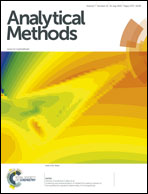Advanced detection methods for traceability of origin and authenticity of olive oils
Abstract
The adulteration of olive oils based on advanced sensors has attracted high interest owing to its health benefits in the prevention and treatment of certain pathologies. Concerning its health and commercial aspects, lower grade oil blending and other illegal additives in virgin olive oil can negatively affect the nutritive value of olive oil. This review focuses on the advances in the sensing and identification of adulteration of olive oil. Optical sensing, chromatography (usually coupled with mass spectrometry), and nuclear magnetic resonance are discussed in detail. Other methods including a DNA-based method, dielectric spectroscopy, differential scanning calorimetry, thermogravimetric analysis and electronic nose among others, are overviewed as well.


 Please wait while we load your content...
Please wait while we load your content...